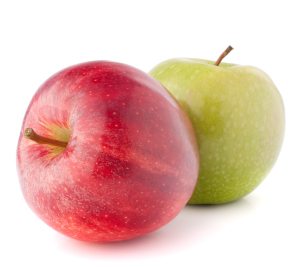
Organic Food – Fresh Red & Green Apple
In simpler terms organic food is
- grown without use of any chemicals
- processed without additives
Processed organic food
This class of organic foods contains only organic ingredients. If non-organic ingredients are included then they must not be more than 5% which means that 95% of the ingredients must be organic. Organic foods must be
- free of additives
- processed without the use of artificial methods
- must not use chemical ripening, food irradiation, and genetically modified ingredients.
- Some pesticides mat be permitted to be used but only if they are non synthetic
Organic foods have a number of advantages over conventional foods
- They are tastier because they are grown naturally and without chemicals of any kind and are farm fresh
- They are nutritious but may not look as colorful and well presented as conventional foods
- Environmentally friendly and protect topsoil from erosion and bring you closer to nature
- They are safer than foods grown with non-organic methods such as pesticides, non-organic fertilizers, antibiotics and hormones
- High food quality which conventional foods cannot match.
- Contain more antioxidants that fight diseases like cancer
Most surveys carried out have come to the conclusion that this kind of farming does not damage the environment because it
- does not consume or release synthetic pesticides into the environment so there is no harm caused to soil, water and land and aquatic wildlife
- sustains a diverse ecosystem of plants and insects, as well as animals
- when calculated either per unit area or per unit of yield, organic farms use less energy and produce less waste, like packaging materials for chemicals.
- Yields from organic farms
- Energy conservation
- Pesticide residue
- Nutritional value
- There are higher levels of vitamins/antioxidants and poly-unsaturated fatty acids such as omega-3 and CLA
- Lower levels of compounds like heavy metals, mycotoxins, pesticide residues and glyco-alkaloids in many crops and milk.
The certification process for defining a farm as organic is rather long. Good management and record keeping are one of the key requirements of the process. Farmers look for guidelines to find out what practices and products are allowed for certification. For land to be certified as organic there should be
- no use of synthetic fertilizers or pesticides for three years before applying for certification
- farmers must provide a detailed plan that describes the entire operation
- they must outline the organic techniques to be used for production and marketing of crops
- if there is lack of fertility in the beginning they must first rectify the problem before starting organic farming.
Indian certification organizations
In India, National Programme on Organic Production (NPOP) defines the regulatory mechanism and is regulated under two different acts for export and domestic markets. NPOP notified under Foreign Trade Development and Regulation Act (FTDR) looks after the export requirement. The
NPOP notified under this act has already been granted equivalence by European Union and Sweden. USDA has also accepted the conformity assessment system of NPOP. Due to this, the product certified by any Indian accredited certification agency under NPOP can be exported to Europe, Sweden and USA without the requirement of re-certification.
To look after the requirement of import and domestic market the same NPOP has been notified under Agriculture Produce Grading, Marking and Certification Act (APGMC). Regulatory body of NPOP under FTDR act is Agricultural and Processed. Foods Export Development Authority (APEDA) under Ministry of Commerce and of NPOP under APGMC act is Agricultural Marketing Advisor (AMA) under Ministry of Agriculture. Accreditation of Certification and Inspection Agencies is being granted by a common National Accreditation Body (NAB). Almost 20 accredited certification agencies are looking after the requirement of certification process. Out of these, 4 agencies are under public sector while remaining 16 are under private management.
Organic labelling
In legal terms to be certified or labelled 100% organic, products must be grown and manufactured in a way that is in compliance with the standards of the country they are sold in.
Foods that are organically grown can state this fact on the labels. Those consumers who want to buy organic foods can look at the labels to see if the foods are 100% organic
- “100% Organic” Foods that are labelled as 100% Organic must contain all organically grown ingredients except for added water and salt.
- “Organic” Foods that are labelled as Organic need to contain at least 95% organic ingredients, except for added water and salt. Up to 5% of the ingredients may be non-organically produced.
- Foods that are labeled ‘Organic’ cannot contain sulphites added as a preservative. Sulphites can create allergies and asthma in some people.
- “Made with Organic Ingredients” Product labels that claim Made with Organic Ingredients need to contain at least 70% organic ingredients, except for added water and salt. They must not contain added sulphites, and up to 30% of the ingredients may be non-organically produced.
- Food products made with less than 70% organic ingredients cannot claim to be organic foods. However, they may state which of the ingredients are organic.
The food safety guidelines for Organic Food products including Licensing & Registration, Labelling, Contaminants, Toxins & Residues, as per Indian Regulations (FSS Act, Rules & Regulations) would imply same as have been defined for other normal food products.
Important – The information contained in this article can be used as a reference guideline on the subject, however the actual guidelines (Regulatory & others) may differ from the content discussed here.
No comments:
Post a Comment